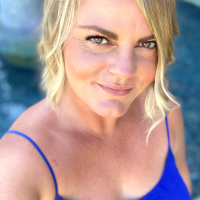I don’t know what I’m f*cking doing. That’s the feel.
A few weeks ago, I copped up to experiencing buyer’s remorse surrounding my decision to leave my former corporate Los Angeles life behind and begin working here at Elephant.
I daydreamed that after having that revelation, things would suddenly become easier. I’d blink my eyes and know how to do everything. And perfectly.
It’s been offered multiple times, “If you need more training, let us know.” I’ve been told with a kind, supportive heart, “Keep asking questions.”
And time after time, like a stubborn toddler, it’s come out of my mouth (or fingers since, y’know, digital work), I don’t need more training.
“Everyone needs more training,” Waylon would respond.
I’ve bitten my tongue and resisted asking questions that I felt were stupid or that I’ve felt I should know at this point.
Flashback to 2005.
I’m in massage school. It’s a go-to-school-or-pay-rent situation, and it sounds like a better deal to shade in an anatomy coloring book, learn t’ai qi, and lay naked beneath a sheet on a massage table to have people knead me for hours.
During class one day, my instructor starts talking about an old Zen parable attributed to a famous conversation between the scholar Tokusan and Zen Master Ryutan in the 8th century:
Scholar Tokusan—who was full of knowledge and opinions about the dharma—came to Ryutan and asked about Zen. At one point Ryutan re-filled his guest’s teacup but did not stop pouring when the cup was full. Tea spilled out and ran over the table. “Stop! The cup is full!”said Tokusan.
“Exactly,” said Master Ryutan. “You are like this cup; you are full of ideas. You come and ask for teaching, but your cup is full; I can’t put anything in. Before I can teach you, you’ll have to empty your cup.” ~ Zen parable
It’s been years and still that story sticks with me just about as firmly as The Little Engine that Could. Like, “I think I can, I think I can,” I often hear in my mind, “Empty your cup.”
The Zen concept of beginner’s mind, or shoshin, is summed up well in “Empty your cup”: the world is easier to take when we empty our minds of all of our preconceptions of how something should be, go, or feel. In doing so, we also begin to practice non-attachment.
When we release our preconceptions by emptying our cup, we’re able to be present in the moment, rather than distracted by the measuring-up of our expectations to what is in front of us. With presence, we are able to take in all of the information offered to us in our everyday experiences—both the good and the ugly.
So, here I am at work. I was educated in journalism at one of the best journalism schools in the nation—one of the top 25 universities in the United States. I have this idea that, for the most part, I know my sh*t. But it doesn’t feel like that here. I can sometimes feel more incompetent than I’ve felt in a long time.
And it’s in those moments that I become aware that I am resisting the emptying of my cup. It is in those moments that I start calling beginner’s mind all sorts of names.
Yep, beginner’s mind is a b*tch.
Because when we have a nice, warm cup of tea in front of us, it’s counterintuitive to think that we should pour it out at someone’s asking. If there’s tea in our metaphorical cup, it’s probably there because we wanted that specific frikkin tea.
Here at Elephant, over the past month or so, I’ve clung to my proverbial tea. It’s an “I should know this” tea, strong in flavoring. If you let it sit too long, it is bitter. And it’s addictive.
And addiction makes things hard to see.
So, here are a few things that clue me in to the fact that my cup overfloweth:
Resentment
Unshakable resentment. The kind I can only run and pant off. The kind where I start blaming every target but myself.
Whenever that feeling that everyone has wronged me comes up, I am alerted to the fact that there’s an idea I am clinging to—a way it was supposed to be. Ideas can always be released—even if just temporarily.
Ask yourself who is to blame, and follow the breadcrumbs. Query yourself as to why they are responsible, and not yourself. No doubt those people have something to serve you.
Self-doubt
I feel like an absolute idiot. I’m convinced I have a learning disability, and that I am incapable of grasping something. The challenge seems impossible. When I run into this unconquerable wall, I become aware that there is something that I can learn from this.
When self-doubt shows up, she almost always brings a lesson. The faster we empty our cups to take her tea, the sooner we’ll uncover the message.
Ask yourself what new thoughts, ideas, or practices might come of opening yourself to both new failures and new successes. Repeat this until you get to a lesson (yes, it might be a hard one).
Resistance
I’m clinging. I’m grasping that fragile teacup so tight that it might shatter in my palms. I feel like a two-year-old holding onto a toy it doesn’t want to share with someone else. I want to stomp my feet and say no.
When I start to throw an internal tantrum, I know it’s time for a time-out to evaluate what I’m holding on to and why.
What isn’t working is a big arrow pointing toward what we do want. Emptying our cup of our resistance makes way for self-discovery, as well as the discovery of other individuals, environments, viewpoints, and situations.
Invite yourself to explore your dissatisfaction. What new thing are you uncomfortable exploring? What old, comfortable thing are you so attached to?
Distrust
No one is safe. I could be in the arms of the most caring person I know and I’d still question their motives. Why are they offering help? They’re telling me my strengths, so something bad must be coming.
While there are times that distrust is important to listen to, this kind of thinking inspires me to search for spaces where I’m harboring self-doubt or resistance. It’s like an egg hunt for the exact cup that needs tipping, rinsing, and re-filling.
Ask yourself what you see in others that threatens you? What is it in them that you feel you lack? What are they reflecting back to you?
~
Our answers to these questions are our lessons. In querying ourselves, we find our cups, and in asking ourselves questions surrounding what we find, we empty them and allow ourselves to begin anew in any situation.
It’s not easy work. It’s exhausting and threatens our sense of perceived safety. Quite frankly, it’s a b*tch. But it’s worth it.












Read 25 comments and reply